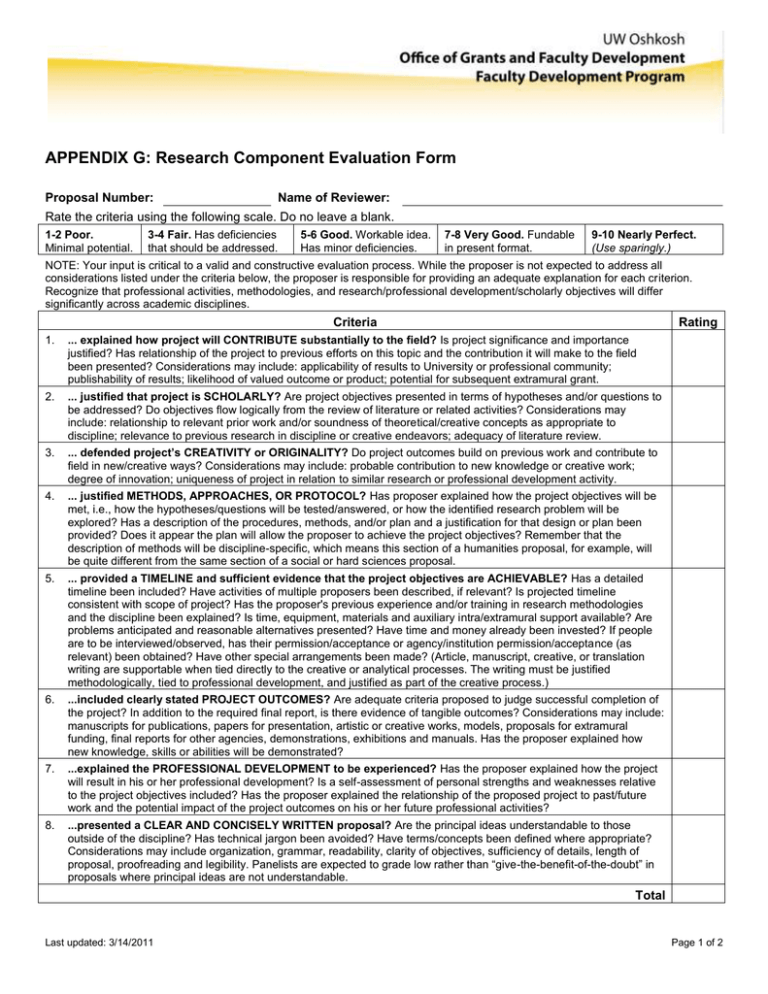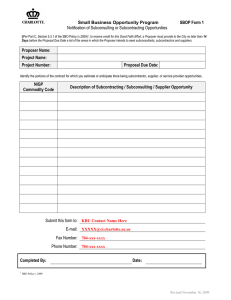APPENDIX G: Research Component Evaluation Form Proposal Number:
advertisement

APPENDIX G: Research Component Evaluation Form Proposal Number: Name of Reviewer: Rate the criteria using the following scale. Do no leave a blank. 1-2 Poor. Minimal potential. 3-4 Fair. Has deficiencies that should be addressed. 5-6 Good. Workable idea. Has minor deficiencies. 7-8 Very Good. Fundable in present format. 9-10 Nearly Perfect. (Use sparingly.) NOTE: Your input is critical to a valid and constructive evaluation process. While the proposer is not expected to address all considerations listed under the criteria below, the proposer is responsible for providing an adequate explanation for each criterion. Recognize that professional activities, methodologies, and research/professional development/scholarly objectives will differ significantly across academic disciplines. Criteria Rating 1. ... explained how project will CONTRIBUTE substantially to the field? Is project significance and importance justified? Has relationship of the project to previous efforts on this topic and the contribution it will make to the field been presented? Considerations may include: applicability of results to University or professional community; publishability of results; likelihood of valued outcome or product; potential for subsequent extramural grant. 2. ... justified that project is SCHOLARLY? Are project objectives presented in terms of hypotheses and/or questions to be addressed? Do objectives flow logically from the review of literature or related activities? Considerations may include: relationship to relevant prior work and/or soundness of theoretical/creative concepts as appropriate to discipline; relevance to previous research in discipline or creative endeavors; adequacy of literature review. 3. ... defended project’s CREATIVITY or ORIGINALITY? Do project outcomes build on previous work and contribute to field in new/creative ways? Considerations may include: probable contribution to new knowledge or creative work; degree of innovation; uniqueness of project in relation to similar research or professional development activity. 4. ... justified METHODS, APPROACHES, OR PROTOCOL? Has proposer explained how the project objectives will be met, i.e., how the hypotheses/questions will be tested/answered, or how the identified research problem will be explored? Has a description of the procedures, methods, and/or plan and a justification for that design or plan been provided? Does it appear the plan will allow the proposer to achieve the project objectives? Remember that the description of methods will be discipline-specific, which means this section of a humanities proposal, for example, will be quite different from the same section of a social or hard sciences proposal. 5. ... provided a TIMELINE and sufficient evidence that the project objectives are ACHIEVABLE? Has a detailed timeline been included? Have activities of multiple proposers been described, if relevant? Is projected timeline consistent with scope of project? Has the proposer's previous experience and/or training in research methodologies and the discipline been explained? Is time, equipment, materials and auxiliary intra/extramural support available? Are problems anticipated and reasonable alternatives presented? Have time and money already been invested? If people are to be interviewed/observed, has their permission/acceptance or agency/institution permission/acceptance (as relevant) been obtained? Have other special arrangements been made? (Article, manuscript, creative, or translation writing are supportable when tied directly to the creative or analytical processes. The writing must be justified methodologically, tied to professional development, and justified as part of the creative process.) 6. ...included clearly stated PROJECT OUTCOMES? Are adequate criteria proposed to judge successful completion of the project? In addition to the required final report, is there evidence of tangible outcomes? Considerations may include: manuscripts for publications, papers for presentation, artistic or creative works, models, proposals for extramural funding, final reports for other agencies, demonstrations, exhibitions and manuals. Has the proposer explained how new knowledge, skills or abilities will be demonstrated? 7. ...explained the PROFESSIONAL DEVELOPMENT to be experienced? Has the proposer explained how the project will result in his or her professional development? Is a self-assessment of personal strengths and weaknesses relative to the project objectives included? Has the proposer explained the relationship of the proposed project to past/future work and the potential impact of the project outcomes on his or her future professional activities? 8. ...presented a CLEAR AND CONCISELY WRITTEN proposal? Are the principal ideas understandable to those outside of the discipline? Has technical jargon been avoided? Have terms/concepts been defined where appropriate? Considerations may include organization, grammar, readability, clarity of objectives, sufficiency of details, length of proposal, proofreading and legibility. Panelists are expected to grade low rather than “give-the-benefit-of-the-doubt” in proposals where principal ideas are not understandable. Total Last updated: 3/14/2011 Page 1 of 2 Approval and Level of Support Do you think this proposal should be funded? Yes What level of support is requested and do you agree? Explain. No Not Applicable Budget and Justification Is requested supplies/expenses/auxiliary budget appropriate and justified? Is requested travel budget appropriate and justified? Is requested student assistance appropriate and justified? Provide a justification for your responses. Yes Yes Yes No No No Are there any technical violations (e.g., double-blind violation, page limit) that make this proposal unfundable? Explain below. Not Applicable Not Applicable Not Applicable Yes No Panelists’ Comments (Required): Please enter specific comments related to your ratings identifying the strengths and weaknesses of the proposed research. A good review is useful to the proposer and helps the Subcommittee to make decisions when disparate reviews are received. Please be considerate with your written comments. You are responsible for the professionalism of your feedback to the proposer. Negative feedback is to be accompanied by constructive suggestions. (Continue on a separate page, if necessary.) Last updated: 3/14/2011 Page 2 of 2
